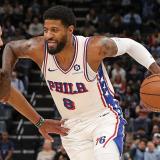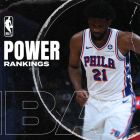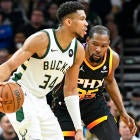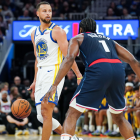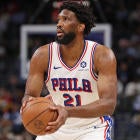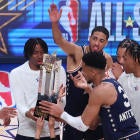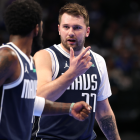If the comments had come from anyone else, they may have seemed ill-timed and ill-informed. For two weeks, the United States national men's basketball team had struggled to find its form against squads with considerably less starpower, prior to finally stomping Serbia to take the gold medal in Rio. And here was someone saying that, rather than the U.S. making apologies for continuing to reign atop the world, "we just need to see these other countries get their acts together and become more competitive."
Nor could these be mistaken for the rantings of an arrogant, ignorant American exceptionalist. The speaker -- in an interview with The Vertical -- was Jerry Colangelo, the director of USA Basketball, but also someone who has repeatedly advocated and recognized basketball's expansion over the past few decades.
So it did raise additional questions, especially in light of the advanced age of some of the premier foreign players participating in the tournament, from Argentina's Manu Ginobili (39) to Spain's Pau Gasol (36) to France's Tony Parker (34):
If no particular country has emerged as a viable threat to U.S. supremacy, and if the likes of Ginobili, Parker, Gasol (and his brother Marc) and Dirk Nowitzki are all in the latter stages of their careers, is it possible that NBA's international explosion is largely played out?
Or has it just evolved, into something more diverse, disperse and more difficult to define?
For answers, CBSSports.com spoke to three men with significant experience in less charted waters: Gersson Rosas, international player personnel scout for USA Basketball and the Houston Rockets' executive VP of basketball operations; Pete Philo, until recently the Indiana Pacers' director of international scouting before leaving to devote all his energy to his TPG Sports Group, which hosts the Pro Sports School; and J.R. Holden, a two-time Euroleague champion for CSKA Moscow who now scouts overseas for the Detroit Pistons.
The consensus is that nothing has stopped, not in the slightest.
Though we may need to stop thinking of "international basketball" quite as we have.
It's not a bad list. Not at all. Four Hall of Fame centers -- Hakeem Olaluwon, Dikembe Mutombo, Patrick Ewing and Arvydas Sabonis and a solid one in Vlade Divac. Solid championship starters in Toni Kukoc and Rick Fox.
But that's it.
Those, according to the NBA's official statistics site, were the only "international players" to average at least 10 points per game during the 1996-97 season. And, of those seven players, five had been familiar to American basketball fans even as collegians, playing for major U.S. universities.
Last season?
That same site lists 32, led by Canada's -- and Minnesota's -- Andrew Wiggins.
Those 32 accomplished that after the NBA listed 100 "international" players on opening night rosters, one fewer than the previous year's record. The NBA defines an "international" player as someone who was born outside the U.S. In the case of Kyrie Irving, who was born in Australia, he chooses to formally identify himself as from that country even if his formative years were spent here (though Irving did play for the U.S. in the Olympics). It does not include players like Reggie Jackson, who was born on a U.S. military base in Italy.
And in terms of pure volume, it appears that number may increase, if the recent NBA Draft is any indication. Fifteen of the 30 first-round picks were foreign-born, including top overall pick Ben Simmons, of Australia, a country that competed well (finishing fourth) in the Olympics without him.
"I think it's a sign of what's to come," Rosas said. "I think we're headed to a continued growth of global basketball talent that is going to fill the NBA. I think you're going to see the impact, even at a higher level, of players like Pau Gasol in Spain. [Andrew] Bogut and [Patty] Mills in Australia. The guys who are playing in Serbia and Lithuania. I think the NBA is very open-minded. San Antonio has had a ton of success with international players. The competition is good. It's good for our sport."
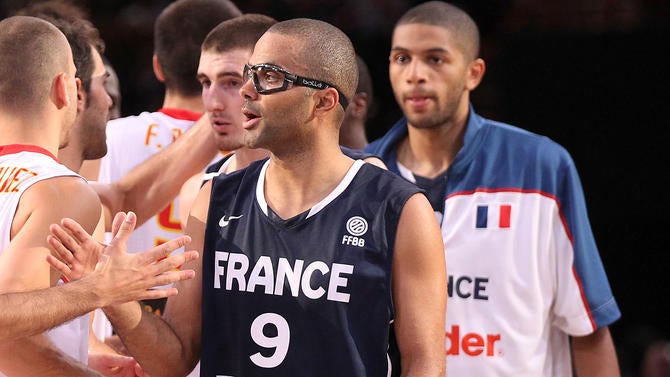
"The game has become more popular in Europe," Holden said. "You had speckles of players. Sabonis. Kukoc. But you didn't have seven guys on a team that could play in the NBA. Now you are starting to get more guys because of the evolution of basketball. Now you see kids who aren't just wearing soccer jerseys, but more basketball jerseys."
Currently, more than 20 percent of the NBA is international-born. Could that reach 30 or 40 or even 50 someday?
"It's heading that direction," Philo said. "At the end of the day, five things matter in terms of productivity and playing in the NBA: speed, skill, size, athleticism and feel. If you have those five things, you're usually a really good NBA player, a starter or an All-Star. From there, it goes into your rotation player, and that can be more skill specific, position specific. It wouldn't surprise me, because people are playing the game at a high level everywhere."
He noted that international players now have more options to develop. Whereas once even the top South Americans would flock to Western Europe to play as locals there, now some have been able to stay home, in part because instruction has improved. Or they've been able to head somewhere unexpected, where they add elements to their game that may not have been native to their own country.
"It was very rare to see a French player play in Serbia," Philo said. "We've seen a couple of guys go do that. It's kind of a shock to a lot of us. But then again, they're playing for a couple of really good clubs. Competitive. Really good young guys. We understood it. But it was kind of shocking. There's a good young player from Germany who went up to Lithuania to play. Usually you see the Lithuanians, Serbians, Croatians go to more Western countries. Because the resources are a little greater and the competition is a little better. That's changed."
Now a player can find competence and creativity nearly anywhere. Holden pointed not only to Americans -- like long-time executive Donnie Nelson, who served as one of Philo's first bosses -- traveling abroad to mold programs, but "the coaches there have developed over the past 10 years." And they have developed their own variations of what many tend to consider "international" or -- if not always geographically accurately -- "European" basketball. That definition tends to apply to making the extra pass, cutting back door, and spreading the floor with shooters. That is what we tend to associate with what Gregg Popovich and the Spurs have incorporated into their offense, as they have leaned on Parker, Ginobili, Boris Diaw and others throughout recent years. And to a degree, that still applies in some places.
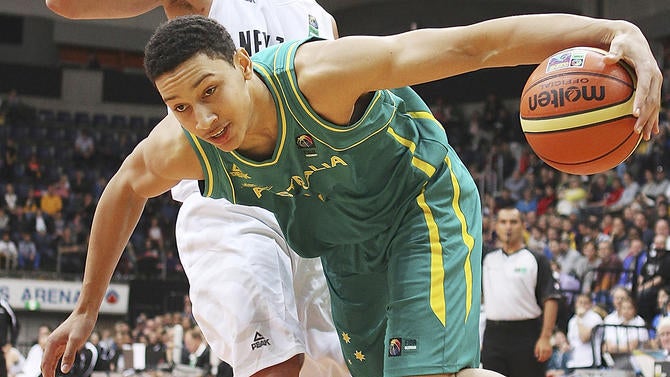
"Spain, Argentina, they play the international game, very European," Rosas said.
And, while Philo acknowledged it is "cliche," he still believes there's truth in the assumption that many players abroad "play a game that is very fundamentally sound." Holden spoke of the absence of AAU ball -- which gives players more time to practice while playing less -- and of the emphasis on young big men honing small man skills, which played a role in the emergence of stretch bigs like Nowitzki and now Latvia's (and New York's) Kristaps Porzingis.
"They get footwork at a very, very young age," Philo said. "They get taught how to run pick and rolls. They get drilled on spacing. They get drilled on ball movement. When they catch the ball. they have rules. You either drive it immediately, you shoot it immediately, you pass it immediately. You do not hold it. Those are foreign rules. Those are the important things to them. They don't have ESPN or the networks that promote flashy play or dunks or what not. Where in our country, that's exciting for us. Over there, they don't have that. They don't turn to that. They play a certain style and they play it well."
But they don't all play exactly the same way. Not anymore. Not as the game has grown and spread. It has spread for many reasons, whether American intervention -- such as the Eurocamp in Treviso that Philo started along with Reebok in 2003 -- or simply exposure of through television and social media.
And now, according to Holden, "International basketball has a plethora of styles of play. Just like the United States. I think the coaches there have taken a little of what the Europeans do and a little from their favorite American teams, and implemented it into the style that best fits their team. I don't think now there's a European style of play. We've gotten accustomed to saying if a guy makes an extra pass or there's a back door cut, or there's an action that we don't see on a regular basis, and people will say, 'that's European basketball.' And I don't know if that's European basketball. I think it's just basketball."
Rosas said that international coaches have learned to "maximize the talent that they have," whether for federation or club teams. And so Australia doesn't play quite like Serbia.
"There is a lot of skill," Rosas said. "They raise the bigs. A lot of back door action."
But the Aussies are mostly characterized by "their physicality, their toughness, their grit. I mean, you're going to battle when you play those guys."
Now, that might not be the case for every player the country produces -- it's no wiser to generalize about that than about every player from overseas playing exactly the same way. Still, it does speak to the hoops diversity around the globe, a diversity that is often influenced by economic factors. As some countries build their programs, and identities, others have started to slide back some.
"It's been hard for guys like myself who have been around a while to see storied programs disappear, whether in Italy or Spain," Rosas said. "Benetton Treviso was a strong power. A number of teams in Italy that have just disappeared. So the history of the game has stopped at some level. Last year I went to Selona in Croatia to go scout, and literally had to turn the lights on in their Hall of Fame room, where they have all the [Drazen] Petrovic memorabilia and it was unbelievable. Pictures and championships and trophies. Fans have no idea of how rich that history is."
So what is the future here, for international players?
Will there be another Nowitzki who -- with Tim Duncan's retirement -- is now the longest-tenured international-born player in the U.S.?
More brothers like the Gasols?
Another point guard quite like Parker, second in tenure among international players to Canada's retired Steve Nash?
The raw numbers of draftees would seem to suggest that.
Sure, there will be some error with all those trials. But teams clearly haven't been scared off by failed high picks like Darko Milicic and Nikoloz Tskitishvili. Philo deems those situational anomalies -- that Milicic was drafted to the wrong place (a contending Detroit team) and Tskitishvili was probably taken too high for his skill set. He said that internationally scouting needs to shift to more than just skill evaluation but also "finding out what makes the person tick internally," with an emphasis on their influences and individuality. When Philo first started scouting, Nelson told him to embrace the unique culture of every country he visited, because that was the only way to understand its players and how they think. "The French think differently than the Serbians, the French think differently from the Danish, the Swedish think differently from the Croatians," Philo said. "You still see the same [NBA] teams making the mistakes internationally and the same teams doing well internationally, and I think that the different is some teams understand the culture."
And this is where the definition of "international" gets complicated. Canada is technically international, but Wiggins competed against Americans during his adolescent and teenage years. "You don't see Ben Simmons coming over here [from Australia] and saying, 'I don't understand what the coach is saying,'" Holden said. "You think of Tony Parker, he had to learn English and all the terminology to play at the level he's playing at.'"
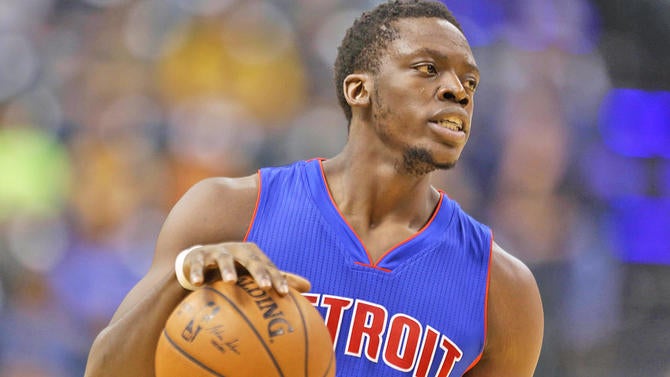
Parker's been playing at a high level for more than a decade, and says he wants to play five more seasons. He will be in the Hall of Fame. But that came after he had some early trouble adjusting. So did Nowitzki. Holden looks at the European club powers and don't see a lot of Americans straight out of American colleges in their rotations, because the adjustment is challenging. "It's no different than a European coming here," Holden said. "You need some time, unless you're in a great situation. Dirk struggled. Porzingis didn't. But he's an outlier. It requires a level of patience and understanding on both ends."
Philo called the 2016 draft class "OK."
"You've got some talented guys in there," Philo said. "I think there are some mistakes in there. Some guys were drafted so high. Simmons could be an all-timer, so talented. And he played college here (LSU for one season) but he spent most of his years in Australia. To me, he is developed internationally."
Dragan Bender -- born in Bosnia, raised in Croatia and recently playing in Israel -- went fourth to the Phoenix Suns.
"Bender has got a lot of talent," Philo said. "He's going to take a little time. He's young still. Really young. Here's the drill. With a guy like him, it's on the team now. If he fails, it's on the team. That's not on him. If you draft a guy at that age, you are now on the clock to develop him. He's your project to develop. If he fails at 18 or 19, it's not his fault. If he's not wired, that's one thing. But I already know he loves to play."
So you could say that, if they want the next Nowitzki or Gasol, the Suns better have their acts together.






